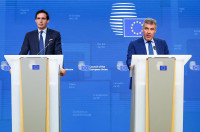Climate & Environment
Green Climate Fund to support Nepal for achieving climate resilience
Country’s only GCF accredited entity Alternative Energy Promotion Centre has been working on various project ideas for accessing climate finance.
Chandan Kumar Mandal
In a major development towards accessing climate finance, the Alternative Energy Promotion Centre and the Green Climate Fund have reached an understanding, which will pave the way for Nepal, one of the most climate change vulnerable countries, to lay its claim for financial support.
The Green Climate Fund (GCF), a global platform that helps countries fight climate change by investing in low-emission and climate-resilient development, and the Alternative Energy Promotion Centre (AEPC), the Nepal government entity responsible for promoting clean and renewable energy, signed the Accreditation Master Agreement last week.
As per the agreement, the GCF will start allocating funds for the AEPC, which is the first and the only agency from Nepal to get the GCF accreditation, to address the country’s climate change mitigation and adaptation needs.
The AEPC received the GCF accreditation in February last year. The GCF accreditation status means the AEPC becomes eligible for claiming and accessing financial support of up to $50 million as its climate action partner.
Nawa Raj Dhakal, director and a spokesperson for the AEPC, described the latest development as a landmark moment in the country’s effort towards dealing with the impacts of climate change.
“This is a framework agreement that allows us to propose our programmes to the GCF Secretariat for receiving the support,” Dhakal told the Post. “With the new agreement, the status of GCF accreditation is formalised now. The development is a milestone in accessing climate finance for our efforts in climate change mitigation and adaptation.”
In November, the country secured its first GCF funding for a project aimed at helping the country adapt to the adverse impacts of climate change.
The 24th board meeting of the GCF in Sangdo, South Korea, had approved the first funding proposal of Nepal submitted by the Food and Agriculture Organisation in partnership with the Ministry of Forest and Environment.
The approved proposal for the project titled ‘Building Resilient Churia Region in Nepal’ will receive $39.3million grant for restoring the resilience of the Chure range.
After getting the accreditation, agencies have to work further following a defined work plan, which is known as entity work programme preparation for GCF. The process from gaining the accreditation to receiving the fund is a three-step process. First, the recognised agencies have to prepare project ideas, followed by project concept notes and finally submitting the funding proposal.
Since getting the accreditation, the centre has already been working 11 different project ideas concentrated on renewable energy and energy efficiency. All of these project ideas have been submitted to the GCF Secretariat and the Ministry of Finance.
The GCF has also consented to these ideas, which are focused on climate change mitigation and adaptation, according to Dhakal.
“All the projects and the progress so far with the GCF serve our longer goals of developing climate change resilience. They are also in line with all our climate change policies and obligations,” said Dhakal.
For now, the AEPC has already moved ahead with two project concept notes—one of them has already been approved by the Finance Ministry and forwarded to the GCF.
The first project is about promoting clean cooking energy for households in 22 TARAI districts. The proposed $40 million project will push for use of electricity and biogas as energy for cooking and switching to improved stoves, according to Dhakal.
The other project, of which concept note has been prepared, is related to the promotion of solar pumping-based irrigation in places of Tarai and mid-hills with poor access to electricity and irrigation infrastructure.
There are two modalities for accessing funds from the GCF. Going by the regular modality can take two-three years, whereas the other one known as Simplified Approval Process (SAP) can be completed in a year, according to Dhakal.
“But the funds for the project pursued under the SAP modality can come down to $10 million,” said Dhakal. “In the meantime, we can work parallelly on other project proposals. The AEPC can also partner with other agencies working for mitigation and adaptation in the future.”




 9.41°C Kathmandu
9.41°C Kathmandu










